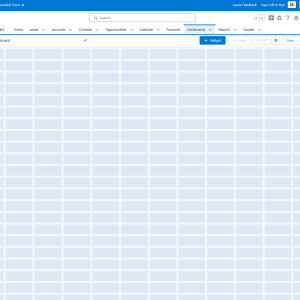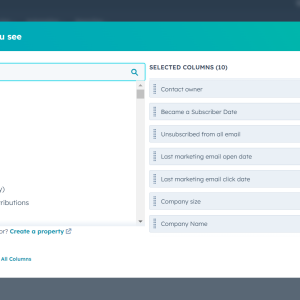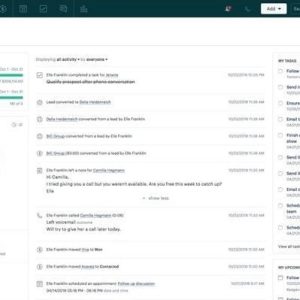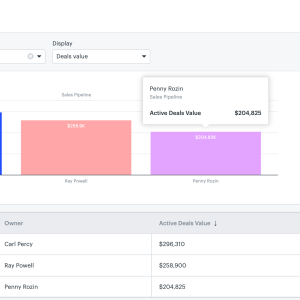CRM (Customer Relationship Management) software has become an essential tool for businesses of all sizes, helping them manage their customer interactions and improve overall productivity. However, choosing the right CRM software can be a daunting task, especially when it comes to pricing. With a wide range of plans, features, and hidden fees, it is crucial for businesses to have a comprehensive understanding of CRM pricing before making a decision. In this guide, we will explore the various CRM pricing plans available, discuss the features that differentiate them, and shed light on any hidden fees that businesses should be aware of. By the end of this guide, businesses will be equipped with the knowledge needed to make an informed decision and find the CRM software that best fits their needs and budget.
CRM software costs start around $7 per user, per month, with more advanced options costing between $15 and $150 per user, per month. For enterprise-level solutions, you could end up spending as much as $300 per user, per month.
You are viewing: CRM Pricing Guide: Plans, Features, and Hidden Fees
If those prices scare you, don’t worry! Some providers offer free-forever plans, while others offer free trials to let you test out the platform.
This guide covers our top picks for the best CRM providers. You can also find the latest deals with our CRM comparison page or directly gather CRM quotes from top providers matched to your exact business needs.
CRM Pricing from Top Providers
How Much Does CRM Cost?
Customer relationship management (CRM) software costs start at around $7 per user, per month, with more expensive plans typically range between $15 and $150 per user, per month, and enterprise-level solutions getting as high as $300 per user, per month.
Yes, the price range of CRM software is a bit dramatic. Rarely are business tools like this so vastly different when it comes to price, but the reality is that there are so many different types of CRM options that you can’t really nail down a specific price. The best way breakdown CRM pricing is based on two critical criteria: team size and industry.
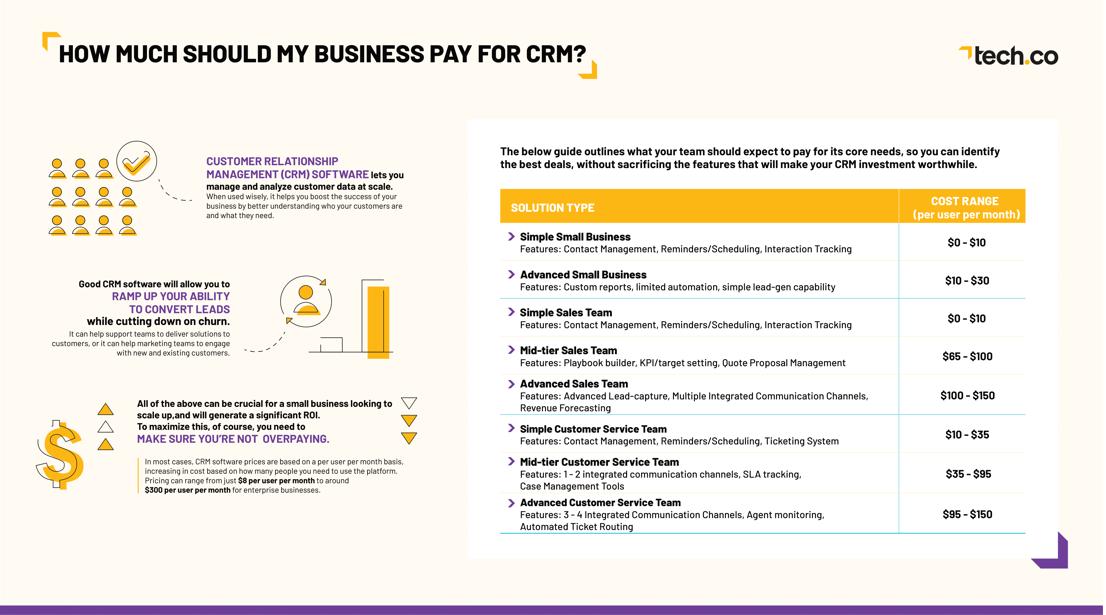
Click image to expand or view our PDF guide to CRM costs here
Below, we’ll explain the difference in CRM pricing between individual, small and medium sized businesses, and enterprise organizations, so you know exactly how much you’ll pay depending on the size of your team.
Additionally, CRM software has a wide range of functions depending on your industry, whether it be marketing, sales, or customer service. We’ll explain the difference between these differently priced CRM options, so you know what you’ll pay depending on your needs.
How Much Does CRM Cost in Your Industry?
Industry is the primary reason for the wide range of CRM prices. Whether you need it to simply track sales analytics or automate your entire marketing strategy can dramatically change the pricing and for good reason. While sales and customer service tools are on the more affordable side, CRM for marketing is often significantly more expensive, as it typically provides a wide range of automation tools that can save your team time and streamline business operations.
Below, we’ll outline how CRM costs work from industry to industry and provide you some information about what you can pay based on your business. Additionally, we’ve provided some glimpses into what you can expect from the CRM options for each industry through our comprehensive comparison tables.
CRM for Sales
In our research, we found that CRM for sales can cost between $12 per user per month and $300 per user per month. This kind of CRM is also ripe for a free forever plan depending on your provider, but these plans can be pretty limited, particularly for businesses with a lot of clients.
See more : What Is a CRM Database? Business Tool Explained
On the lower end of the pricing spectrum — typically priced between $12 and $25 per user per month — CRM for sales can be pretty bare bones. Starter plans from providers like Salesforce, Freshsales, and other CRM for sales are often missing significant lead capture, communication, and conversion features, which are the bread and butter of these kinds of platforms. Fortunately, regardless of price, you’re still getting access to a wide range of analytics, which can be helpful for any growing team.
Middle tier plans — priced between $39 and $99 per user per month — are where the biggest value is added when it comes to CRM for sales, particularly when it comes to lead conversion, arguably one of the most important aspects of sales. Nearly every top-rated CRM from our research adds features like lead scoring, quote proposal management, and the ability to add products to deals at the mid-tier plan, all of which add some serious functionality for only a small price increase.
If you’re a larger organization with specific CRM needs, then enterprise-level plans — which cost between $70 and $300 per user per month — could be your best option, but beware. They often don’t add a whole lot in terms of features and just bolster the capacity of existing features, like data limits, automation builders, and support options. Generally speaking, if you aren’t a truly large business, you can stick to the middle tier.
Best CRM for Sales: Comparison
CRM for Customer Service
In our research, we found that CRM for customer service costs between $14 per user per month and $300 per user per month. Like CRM for sales, some of these providers offer free forever plans, which are more of an extended free trial than a realistic option for businesses that need to organize their customer service needs.
Starter plans for CRM for customer service — typically priced between $14 and $25 per user per month — are actually surprisingly robust, offering plenty of customer service-facing features right out of the gate. Where these plans are lacking is team management features, which are great for businesses that need to keep track of team service level agreements, individual targets, and team hierarchies. They also lack in their own customer service, which is a nice bit of irony.
Like CRMs for sales, your best value is going to be in the mid-tier plans — typically priced between $49 and $79 per user per month. These plans usually add features and functionality with only a minor increase to price. With many of these types of plans, you’ll unlock features like offline customer support options, advanced analytics, and additional support channels like social and live chat.
Again, enterprise-level plans — typically costing between $80 and $300 per user per month — for customer service CRMs are truly designed for larger businesses only, as they don’t add much in features. They tend to increase the capacity of existing features, like chatbot sessions, custom dashboards, and automation builders. Seriously, unless you’re a really big business, the mid-tier plans should be more than enough.
Best CRM for Customer Service: Comparison
CRM for Marketing
This is where the prices can get pretty high. CRM for marketing can range in price from $19 per user per month to $15,000 per user per month. No, that’s not a typo. There are a few free plans for marketing CRM but compared to the more robust options on the list, they barely do anything.
The starter plans are pretty affordable, ranging in price from $19 to $79 per user per month. At this price, you aren’t getting a lot of the automation features that make the other plans so expensive. In fact, in most cases, you’re only getting email marketing functionality at this price point, which is obviously an important aspect of marketing, but not great for businesses that are looking to scale down the road.
Mid-tier plans, which range in cost from $150 to $800 per user per month, are where the good stuff comes in at a comparatively reasonable price. These plans typically have multi-channel functionality, allowing marketing from social media, content, and paid campaigns. They also add automations, which can save time and money on your team, as standard operations will take place without employee interaction. You’ll also get notably better analytics and customer databases with these plans, which are always helpful for something like marketing.
Finally, the enterprise-level plans, priced from $300 to $15,000 per user per month, like CRM for sales and customer service, are really only geared towards large businesses that need added users on the platform and more capacity for features. Sometimes they add more email templates, more automation builders, more custom dashboards, or more contacts on your contact list.
Best CRM for Marketing: Comparison
How Much Does CRM Cost for my Team Size?
As with most business resources, the size of your business is always going to factor in when it comes to price. CRM software absolutely follows that trend with its price per user (per month) standard framework, which means you’ll be paying more for every single employee that needs access to the software.
In addition to that, larger teams are likely going to need more features and more functionality from a CRM platform, which means they’re typically going to need to opt for a more expansive pricing plan. This, of course, comes with a higher per user per month cost. Likewise, smaller teams won’t require that much functionality, so they can opt for the cheaper plans.
Generally speaking, big teams are going to pay more, and smaller teams are going to pay less. As for the specifics, read on for an in-depth look at your particular business size and check out our best CRM for small business or best CRM for startups guides for more information.
CRM for Small Businesses
See more : HubSpot vs Salesforce (2023) – Which CRM Is Best and Why?
If you’re a small business looking for CRM software, you can expect to pay between $7 and $30 per user per month for a CRM platform.
These options aren’t always equipped for robust functionality or massive client lists, but they can help with the basics for sales, customer service, and marketing. In fact, many platforms offer standalone products for small businesses, like Zoho Bigin and Freshsales Suite, which are a bit more barebones as far as features go, but the low prices are attractive for businesses without a big budget.
Here’s a list of some of the best small business CRM options, as well as general CRMs that work within typical small business needs.
Best CRM for Small Business: Comparison
CRM for Medium-Sized Businesses
Medium-sized businesses will have the toughest time picking a CRM for them, as there are so many options with so many different features at so many different price points. You can expect to pay between $30 and $150 per user per month with this size business, unless you’re looking for marketing automation features, which will bump the price up substantially.
The key to understanding what you’ll pay for CRM as a medium-sized business is to know what you need it for. Features and functionality vary greatly in this category, which means knowing exactly what you need before you buy will guide your process. Do you need it for sales funnels or marketing? Do you need automation features, or do you have plenty of team members to use the platform? Are analytics important to you, or would you rather have robust customer support?
Simply put, the best way to make the right decision on this front is to have your needs laid out ahead of time, so you know what to weigh up.
CRM for Enterprise Organizations
This decision is much easier. Depending on which provider you’re looking at, there’s almost always a pricing plan named “Enterprise,” or similar, which is the best place to start if you consider yourself an enterprise-level business. These plans are quite expensive, typically ranging in cost from $120 to $300 per user per month, and as high as $15,000 per user per month for marketing.
Remember though, these plans really are only for enterprise-level businesses. They don’t usually add a lot of new features, instead increasing the capacity of existing features, so they can be used by bigger teams more often. Simply put, these plans are expensive for a reason, and that reason is big teams need big options.
Free Trials and CRM Discounts
Most CRM platforms offer a free trial of about 14 days, although some may offer a free month or just a free week. As long as you know what features your business needs and you set aside some time to familarize yourself with the platform, this should be all the time you need to decide if it makes sense for you. The free trial should include virtually all the tools that a paid version of the CRM software would offer.
Some CRM services also offer a permanent free plan. Hubspot and Freshsales are two of the most well-known providers to include an entirely free plan, although both come with restrictions. Hubspot Free does not offer core CRM features including contact management, Gmail and Outlook integrations, ticketing support, ad management, or email tracking. However, if your business has no CRM budget, these free plans are much better than nothing.
CRM platforms frequently offer discounts such as half off your first three months. You’ll typically have to commit to a full year in order to get them. These discounts can vary, too, so if you don’t see a good one from your preferred platform, waiting a month or two could make a difference.
That’s a wrap on “ CRM Pricing Guide: Plans, Features, and Hidden Fees ” We hope you’ve found a trove of useful insights and fresh perspectives. Your opinions and ideas matter to us—join the conversation below and share your take! Hungry for more tech insights? Dive into our diverse collection of articles where innovation meets practicality. Discover More CRM Softwares.
Stay in the loop with the latest in AI and tech – your journey into the digital future continues at newslength.com.
#CRM #Pricing #Guide #Plans #Features #Hidden #Fees
Source: https://newslength.com
Category: CRM

